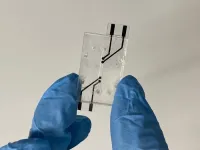(Press-News.org) (LOS ANGELES) – October 25, 2023 - The Terasaki Institute for Biomedical Innovation (TIBI) has developed a novel organ-on-a-chip device for measuring electrical resistance across endothelial barriers. This chip had carbon-based, screen-printed electrodes incorporated into a multi-layered, microfluidic chip fabricated by a simple and cost-effective method.
Endothelial cells line blood and lymph vessels of the body and form a barrier layer which controls the flow of fluid and substances to and from the vessels and surrounding tissues. Study of the crucial roles that endothelial barriers play in healthy and disease states – most notably with the blood brain barrier – have prompted the need for in vitro models for research and therapeutic drug development.
Typical sensors for these types of studies measure trans-endothelial electrical resistance (TEER), a primary indicator of the strength and integrity of an endothelial barrier. Incorporating a TEER sensor into an organ-on-a-chip allows one to measure TEER in real-time in an in vitro model that recapitulates an endothelial barrier in the body.
There is, however, a lack of standardization in these models. TEER measurements are notoriously difficult to obtain with accuracy, and they can be subject to variations in temperature and device design, as well as electrode shape and position.
There are inherent drawbacks in electrode fabrication as well. One method commonly used is to insert platinum wires into the chip. This manual assembly results in limited throughput and consistency. An alternative method using physical vapor deposition of metallic materials onto a substrate circumvents these problems but necessitates microfabrication facilities and special training. In addition to fabrication, electrode material costs and availability should be considered, as these can vary widely.
Taking these factors into account, the TIBI team elected to screen print electrodes on to the chip, using commercially available, inexpensive printing components. These components, of the sort used for T-shirt silk screening, included a screen-printing frame, carbon ink, and a squeegee. In place of silkscreen mesh stencils, more economical thin paper stencils were prepared. After printing, the imprint was heat cured, resulting in a firmly adhered carbon-based electrode that was both electrically conductive and biocompatible.
In designing their device, the team chose a less commonly used plastic called poly(methyl methacrylate) (PMMA), both for its properties conducive to rapid and scalable fabrication methods and for its hydrophilic (“water-loving”) nature, which avoids unwanted adsorption of certain hydrophobic (“water-repelling”) molecules onto its surface.
The chip included a porous membrane for growing cellular barriers, sandwiched between two PMMA layers, which are in turn sandwiched between two screen-printed electrode containing PMMA layers. The team utilized a hybrid method for bonding the PMMA layers, which had a strong seal and prevented leakage while avoiding deformation and clogging of the chip’s microfluidic layers.
To test the chip, layers of brain endothelial cells were cultured onto the porous membrane, and the TEER values for the in vitro barrier were measured experimentally for four days. These data were compared against other TEER values for this type of endothelial barrier, and there was good correlation, with the measured TEER values increasing as more cells grew and strengthened the barrier. Furthermore, the introduction of a barrier-disrupting inflammatory protein resulted in a decrease in TEER values, further validating the measurements obtained with the new chip.
This proof-of-concept work by the TIBI scientists could lend itself well to automation and standardization, with the potential for adapting the chip to a plate format and the utilization of ink-jet printing for electrode fabrication, for example. And while additional application-specific optimization may be necessary, it has the versatility to be used with various cell types and geometric designs for different uses.
“We’ve taken an important step by surmounting the challenges involved in creating TEER sensors for organ-on-a-chip devices,” said TIBI Director and CEO, Ali Khademhosseini, Ph.D. “This could lead to a greater technological expansion for a variety of research applications and therapeutic drug development.”
Authors are Satoru Kawakita, Shaopei Li, Huu Tuan Nguyen, Surjendu Maity, Reihaneh Haghniaz, Jamal Bahari, Ning Yu, Kalpana Mandal, Praveen Bandaru, Lei Mou, Menekse Ermis, Enam Khalil, Safoora Khosravi, Arne Peirsman, Rohollah Nasiri, Annie Adachi, Aya Nakayama, Remy Bell, Yangzhi Zhu, Vadim Jucaud, Mehmet Remzi Dokmeci, Ali Khademhosseini.
Funding was provided by the National Institutes of Health (TR003148-01, GM126571, and R01AR074234) and the support of the Natural Sciences and Engineering Research Council of Canada (NSERC), [funding reference number PDF 546263-2020].
###
About the Terasaki Institute for Biomedical Innovation
The Terasaki Institute for Biomedical Innovation is accelerating the pace of translational research by supporting the world’s leading scientists with an open, entrepreneurial environment for bioengineering new materials, biological models, and advanced technologies to address critical challenges to the health of the planet and its people. The Institute’s worldwide collaborations with academic, clinical, and entrepreneurial partners provide a rich foundation for translating innovations to the real world.
Contact:
Stewart Han
President
Terasaki Institute for Biomedical Innovation
shan@terasaki.org
END
Screen printed electrodes for measuring endothelial barrier integrity
Scientists incorporate electrodes with beneficial features into customizable organ-on-a chip device
2023-10-25
ELSE PRESS RELEASES FROM THIS DATE:
UTSA researchers receive $3.6 million National Science Foundation grant to break down language barriers in engineering education
2023-10-25
(SAN ANTONIO, OCTOBER 25, 2023)—The National Science Foundation (NSF) has awarded a five-year, $3.6 million grant to two professors at The University of Texas at San Antonio (UTSA) to develop a better way to communicate engineering acumen to diverse engineering classes.
Joel Alejandro Mejia and M. Sidury Christiansen are collaborating on an ethnographic project, “Rhetorical Engineering Education to Support Proactive Equity Teaching and Outcomes (RESPETO).” The project will include a handbook of recommended pedagogical approaches to address exclusionary language and linguistic practices in engineering classes.
The project was motivated by several factors. Among them, ...
Marketing research is too narrow: Hw the field must change to keep producing relevant, timely knowledge
2023-10-25
Researchers from TU Dortmund University and RWTH Aachen University published a new Journal of Marketing article that examines how specific types of marketing knowledge contributions have developed over the past few decades and suggests ways to move the field toward “big picture” theories that will have greater impact.
The study, forthcoming in the Journal of Marketing, is titled “Conceptual Contributions in Marketing Scholarship: Patterns, Mechanisms, and Rebalancing Options” and is authored by Bastian Kindermann, ...
Sunflower extract fights fungi to keep blueberries fresh
2023-10-25
Opening a clamshell of berries and seeing them coated in fuzzy mold is a downer. And it’s no small problem. Gray mold and other fungi, which cause fruit to rot, lead to significant economic losses and food waste. Now, researchers report in ACS’ Journal of Agricultural and Food Chemistry that compounds from sunflower crop waste prevented rotting in blueberries. They suggest the food industry could use these natural compounds to protect against postharvest diseases.
Sunflowers are cultivated around the world for their seeds and oil, but the flower stems — known as receptacles — are generally considered to be a waste product. Noting that this crop is particularly ...
Global platform study presents results to guide care of severely ill patients with COVID-19 using routinely available drugs
2023-10-25
The Global Coalition for Adaptive Research (GCAR) in collaboration with the University of Pittsburgh and UPMC, on behalf of the REMAP-CAP Investigator Network, announce clinical trial results examining the use of vitamin C and simvastatin to treat severely ill patients with COVID-19.
Published today in JAMA and NEJM, and presented at the European Society of Intensive Care Medicine in Milan, the studies are part of the ongoing Randomized Embedded Multifactorial Adaptive Platform for Community Acquired Pneumonia (REMAP-CAP) trial.
Simvastatin, a widely available and inexpensive drug that is included on the WHO list of essential medicines, ...
Intravenous Vitamin C for patients hospitalized with COVID-19
2023-10-25
About The Study: In hospitalized patients with COVID-19, vitamin C had low probability of improving the primary composite outcome of organ support–free days and hospital survival in two harmonized randomized clinical trials.
Authors: Neill K. J. Adhikari, M.D.C.M., M.Sc., of the Sunnybrook Health Sciences Centre in Toronto, and Francois Lamontagne, M.D., M.Sc., of the Universite de Sherbrooke in Sherbrooke, Canada, are the corresponding authors.
To access the embargoed study: ...
Sigh ventilation in patients with trauma
2023-10-25
About The Study: In a randomized clinical trial including 524 trauma patients receiving mechanical ventilation with risk factors for developing acute respiratory distress syndrome, the addition of sigh breaths did not significantly increase ventilator-free days. Prespecified secondary outcome data suggest that sighs are well-tolerated and may improve clinical outcomes.
Authors: Richard K. Albert, M.D., of the University of Colorado, Denver, is the corresponding author.
To access the embargoed study: Visit our For The Media website at this link https://media.jamanetwork.com/
(doi:10.1001/jama.2023.21739)
Editor’s Note: Please see the ...
Landiolol and organ failure in patients with septic shock
2023-10-25
About The Study: The results of this randomized clinical trial involving 126 patients do not support the use of the very short-acting beta-blocker landiolol for managing patients with tachycardia treated with norepinephrine for established septic shock.
Authors: Tony Whitehouse, M.D., of Queen Elizabeth Hospital in Birmingham, United Kingdom, is the corresponding author.
To access the embargoed study: Visit our For The Media website at this link https://media.jamanetwork.com/
(doi:10.1001/jama.2023.20134)
Editor’s Note: Please ...
Convalescent plasma reduces mortality by 10% in COVID-19 patients in acute respiratory distress and on artificial respiratory assistance
2023-10-25
This is the conclusion of a multicentre study conducted by the University Hospital of Liège (CHU of Liège) in collaboration with 17 hospital intensive care departments in Belgium during the Covid-19 phases between October 2020 and March 2022.
This is the first study to look specifically at the effect of administering convalescent plasma to these patients whose vital prognosis is severely compromised. It confirms the value of this method for inducing passive immunisation in these patients.
The results are published in the leading medical journal The New England Journal of Medicine.
In a study published in The New ...
The changing face of gun ownership in the United States
2023-10-25
Learning how to shoot a handgun at a Las Vegas gun convention had never been on Jennifer Hubbert’s bucket list. But last fall, the professor of anthropology and Asian studies found herself doing just that. “Given my research, it felt like something I needed to do,” she says.
Hubbert is currently exploring a novel question regarding gun culture in the United States: “What does it mean to be a liberal gun owner?” The National Endowment for the Humanities (NEH) has recently awarded Hubbert with a grant to support her research and book project: Gun Culture 4.0: Understanding the New Demographics of ...
Dr. Anthony Fauci to be awarded 2024 Inamori Ethics Prize by Inamori International Center for Ethics and Excellence
2023-10-25
CLEVELAND, OH—The Inamori International Center for Ethics and Excellence at Case Western Reserve University will award Dr. Anthony Fauci, a physician, immunologist, and infectious disease expert, with the 2024 Inamori Ethics Prize.
“Dr. Fauci has cared not only for the nation’s health, but also the health of the world,” said Case Western Reserve President Eric W. Kaler. “As a scientist, research leader and public health advisor, his contributions to scientific discovery have truly improved lives. His leadership through one of the most challenging times in history—the COVID-19 pandemic—serves ...
LAST 30 PRESS RELEASES:
Kidney cancer study finds belzutifan plus pembrolizumab post-surgery helps patients at high risk for relapse stay cancer-free longer
Alkali cation effects in electrochemical carbon dioxide reduction
Test platforms for charging wireless cars now fit on a bench
$3 million NIH grant funds national study of Medicare Advantage’s benefit expansion into social supports
Amplified Sciences achieves CAP accreditation for cutting-edge diagnostic lab
Fred Hutch announces 12 recipients of the annual Harold M. Weintraub Graduate Student Award
Native forest litter helps rebuild soil life in post-mining landscapes
Mountain soils in arid regions may emit more greenhouse gas as climate shifts, new study finds
Pairing biochar with other soil amendments could unlock stronger gains in soil health
Why do we get a skip in our step when we’re happy? Thank dopamine
UC Irvine scientists uncover cellular mechanism behind muscle repair
Platform to map living brain noninvasively takes next big step
Stress-testing the Cascadia Subduction Zone reveals variability that could impact how earthquakes spread
We may be underestimating the true carbon cost of northern wildfires
Blood test predicts which bladder cancer patients may safely skip surgery
Kennesaw State's Vijay Anand honored as National Academy of Inventors Senior Member
Recovery from whaling reveals the role of age in Humpback reproduction
Can the canny tick help prevent disease like MS and cancer?
Newcomer children show lower rates of emergency department use for non‑urgent conditions, study finds
Cognitive and neuropsychiatric function in former American football players
From trash to climate tech: rubber gloves find new life as carbon capturers materials
A step towards needed treatments for hantaviruses in new molecular map
Boys are more motivated, while girls are more compassionate?
Study identifies opposing roles for IL6 and IL6R in long-term mortality
AI accurately spots medical disorder from privacy-conscious hand images
Transient Pauli blocking for broadband ultrafast optical switching
Political polarization can spur CO2 emissions, stymie climate action
Researchers develop new strategy for improving inverted perovskite solar cells
Yes! The role of YAP and CTGF as potential therapeutic targets for preventing severe liver disease
Pancreatic cancer may begin hiding from the immune system earlier than we thought
[Press-News.org] Screen printed electrodes for measuring endothelial barrier integrityScientists incorporate electrodes with beneficial features into customizable organ-on-a chip device



